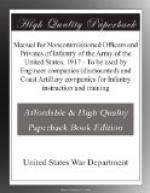At the sounding of “Call to quarters” all men will repair to their company street.
After taps has sounded all talking must cease and all lights must be extinguished, and so remain until first call for reveille.
In camp all enlisted men are prohibited from crossing the officers’ street, or from visiting officers’ tents unless actually engaged in some duty requiring them to do so, or sent for by an officer.
Men are not allowed to leave camp without a pass signed by the company commander and countersigned by the regimental adjutant. The first sergeant is sometimes allowed to give men permission to leave camp from retreat to taps.
The noncommissioned officer in charge of quarters, detailed for 24 hours goes on duty each day at reveille. He is responsible that the grounds around the company are kept in proper police; that no loud noise, disturbance, or disorder occurs in the company street; that men confined to the company street do not leave the same without proper authority. He reports men who are sick to the surgeon. He may be required to report all other details called for. He accompanies the captain in his daily inspection of the company. He will not leave the company street during his tour of duty except as provided above.
One or two privates are detailed daily as kitchen police. They go on duty at reveille. It is their duty to assist the cooks in the kitchen. They assist in the preparation of meals, wait on the table, wash dishes, procure water and wood, chop firewood, and keep the kitchen, mess tent, and surrounding ground policed. They are under the orders of the mess sergeant and the cooks.
Rifles need careful attention in camp. They should be cleaned and oiled daily, preferably just before retreat or parade. It is advisable for each man to have a canvas cover to keep off the dust and dampness. In a shelter-tent camp tie the rifle, muzzle up, to the pole of the tent, placing a chip of wood under the butt plate and an oily rag over (never inside) the muzzle.
Wet shoes should be filled with oats or dry sand, and set in a cool place to dry. Never dry them by a fire.
Uniforms need special care, as camp service is very hard on them. In a permanent camp every man should have two pair of breeches. The coat will seldom be worn except at parade or retreat. One pair of breeches and the coat should be kept neat, clean, and pressed for use on ceremonies, inspections, and when going on pass. Woolen uniforms may be cleaned and freed from spots by rubbing with a flannel rag saturated with gasoline. Cotton uniforms may be washed with water, soap, and a scrubbing brush, wrung out, and stretched, properly creased, on a flat wood surface in the sun to dry. Leggings can be similarly washed. Hats should be cleaned with gasoline, and dampened and ironed to restore their shape.




